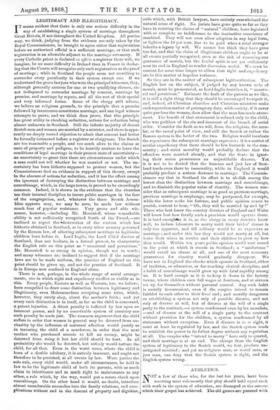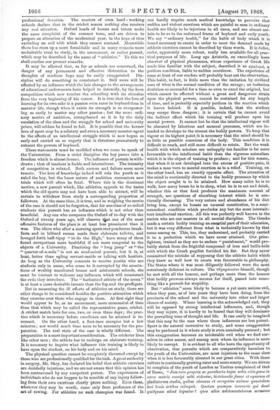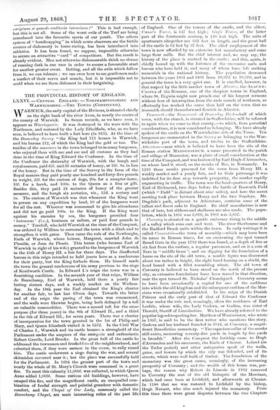ATHLETICS.
NOT a few of those who, for the last ten years, have been asserting most vehemently that play should hold equal rank with work in the system of education, are dismayed at the success which their gospel has achieved. The old games are pursued with professional devotion. The masters of even hard - working schools declare that in the cricket season nothing else receives any real attention. Oxford heads of houses and tutors make the same complaint of the summer term, and are driven to propose an alteration of the academical year, in the hope of thus excluding an evil with which they cannot contend. Meanwhile there has risen up a more formidable and in many respects more undesirable rival to study, in the amusement, or rather pursuit, which may be described by the name of "athletics." To this we shall confine our present remarks.
It may be allowed that, as far as schools are concerned, the danger of any permanent and effective distraction to the thoughts of studious boys may be easily exaggerated. Dis- cipline will do something to counteract it. Still more will be effected by an influence which the late changes in the arrangement of educational endowments have helped to intensify, by the keen competition which now touches the schoolboy with its stimulus from the very beginning of his career. It is true that the love of learning for its own sake is a passion even rarer in boyhood than in matures life, though when it exists its strength is so overpower- ing as easily to master any other passion ; but the more ordi- nary motive of ambition, strengthened as it is by the daily emulation of the class and the struggle for school and university prizes, will seldom be found to fail. It is possible that the keener love of sport may be a salutary and even a necessary counter-agent to the effects of an intellectual struggle which is now begun so early and carried on so eagerly that it threatens prematurely to exhaust the powers of boyhood.
These statements must be modified when we come to speak of the Universities. From a strict discipline the boy passes into a freedom which is almost licence. The influence of parents is with- drawn ; that of teachers is feeble and intermittent. The intensity of competition is relaxed. Both success and failure seem more remote. The love of knowledge indeed will rule the youth as it ruled the boy, but the baser nature of ambition encounters new trials which will often be fatal. Where this is the dominant motive, a new pursuit which, like athletics, appeals to the tastes which the old sports may not have been able to attract, will be certain to withdraw from study a corresponding proportion of followers. At the same time, it is true, and in weighing the merits of the case it should not be forgotten, that for one class of so-called students this pursuit has an influence which is not other than beneficial. Any one who compares the Oxford of to-day with the Oxford of twenty years ago, will observe tat one of the most offensive features of the place is at least less prominent than it was. The idlers who after a morning spent over ponderous break- fasts and in billiard rooms made their elaborate toilette, and lounged forth half-tipsy "to do the High," have many of them found occupations more healthful if not more congenial to the objects of a University. Practising the " long jump" or "the " quarter-of-a-mile " is not an academical pursuit, but it is, at least, better than ogling servant-maids or talking with hostlers. As long as the University consents to receive youths who are students only in name, who come to it corrupted by the associa- tions of wealthy uncultured homes and aristocratic schools, she must be content to welcome any influence which will counteract the evils they introduce. The " barbarized athlete of the arena" is at least a more desirable inmate than the fop and the profligate.
But in measuring the ill effects of athletics on study, there are other things to be considered besides the positive attraction which they exercise over those who engage in them. At first sight they would appear to be, as an amusement, more economical of time than that which may be called the representative game, cricket. A cricket match lasts for one, two, or even three days ; the prac- tice which is necessary before excellence can be attained is in- cessant. On the other hand, a foot-race occupies but a few minutes ; nor would much time seem to be necessary for the pre- paration. The real state of the case is wholly different. The preparation is a most important consideration. The cricketer lives like other men ; the athlete has to undergo an elaborate training. It is necessary to inquire what influence this training is likely to lave upon the student, on his body and on his mind.
The physical question cannot be completely discussed except by those who are professionally qualified for the task. A great authority in surgery, Mr. Skey, has declared his belief that athletic exercises are decidedly injurious, and we are not aware that this opinion has been contravened by any competent person. The experiences of individuals who do not happen to be sensible of any injury follow- ing from their own exertions clearly prove nothing. Even these, whatever they may be worth, came only from professors of the art of rowing. For athletics no such champion was found. It can hardly require much medical knowledge to perceive that sudden and violent exertions which are painful to men in ordinary health are likely to be injurious in all cases, and are almost cer- tain to be so to the unformed frame of boyhood and early youth. We say "ordinary health," for the habit of body which it is found necessary to create in order to meet the demand made by athletic exercises cannot be described by these words. It is fuller, ruder, apparently more robust, really less available for all prac- tical purposes of life. Long ago Aristotle, an exceedingly keen observer of physical phenomena, whose experience of Greek life made him familiar with the subject, described it as spaxEp,i, a perilous condition, liable to sudden overthrow. The experience of some at least of our readers will probably bear out the observation. This habit, in fact, is little more than the imitation by civilized man of what is the normal condition of the savage ; an imitation doubtless so successful for a time as even to excel the original, but which cannot be effected without a great and dangerous strain upon the physical powers, cannot be sustained for any length of time, and is probably especially perilous in the reaction which it leaves behind. It is possible, indeed, that the student may escape these dangers ; it is certain that he cannot avoid the indirect effect which his training will produce upon his. mental powers. It cannot but be that the intellectual vigour will be obscured by laborious and unusual processes, which are in- tended to develope to the utmost the bodily powers. To keep that vigour at its highest point it is necessary that the mind should be as little as possible conscious of the body. This condition it is. difficult to reach, and still more difficult to retain. But the weak health with which scholars are unhappily too familiar is far more favourable to the intellectual habit than the vigorous animalism which it is the object of training to produce ; and for this reason, that when it is not developed into the excess of positive pain, it makes a man turn to mental exertion as to a relief. Training, on. the other hand, has an exactly opposite effect. The attention of the mind is continually directed to the bodily processes by which the object sought is to be attained. How many miles he is to. walk, how many hours he is to sleep, what he is to eat and drink, whether this or that food produces the maximum amount of' strength, are questions of absorbing interest which he is con- tinually discussing. The very nature and abundance of his diet. bring him, except he boasts an unusual constitution, to a semi- somnolent condition which precludes any but the most intermit- tent intellectual exertion. All this was perfectly well known to the nation who are our masters in all mental discipline. The Greeks- made a certain bodily training an essential part of their education, but it was very different from what is technically known by that name among us. This, too, they understood, and probably carried it to a perfection which we have never attained. Our prize- fighters, trained as they are to endure "punishment," would pro- bably shrink from the frightful compound of iron and bull's-hide with which the Greek pugilist fortified his fist. But they never committed the mistake of supposing that the athletic habit which. they knew so well how to create was favourable to philosophy. The States where it was most diligently followed were the most notoriously deficient in culture. The Olympionices himself, though he met with all the honour, and perhaps more than the honour- that bodily prowess always secures for itself, passed into some- thing like a proverb for stupidity.
But " athletics " seem likely to become a yet more serious evil,. when they pass, as of late years they have been doing, from the precincts of the school and the university into other and larger classes of society. Where learning is the acknowledged end, they will be opposed by strong intellectual influences, and, though. they may injure, it is hardly to be feared that they will dominate the prevailing tone of thought and life. It can easily be imagined that this may be the case where these influences are less potent. Sport is the natural corrective to study, and some exaggeration may be pardoned in it where study is even nominally pursued ; but this exaggeration becomes an intolerable evil when we find our- selves in other scenes, and among men whom its influence is more likely to corrupt. It is evident to all who have the opportunity of observation, that pursuits which are comparatively harmless to. the youth of the Universities, are most injurious to the same class. when it is less favourably situated in our great cities. With these culture is continually growing rarer and more scanty. We are driven to complain of the youth of London as Tacitus complained of that of Rome, "Tam vero propria ac peculiaria hujus urbis villa pcene in utero mains concipi mihi videntur, histrionalis favor et equorum et gladiatortan studia, quibus obsesses et occepates animus quantulunt loci boas artibus relin quit. Quotum quempte inveneris qui domi quidquam aliud loquatur ? quos alias adolescentulorum sermones
excipimus si quando auditoria intravimus?" This is bad enough, but this is not all. Some of the worst evils of the Turf are being introduced into the favourite sports of our youth. The odious systetu of" handicapping" in which acute observers see the fertile sources of dishonesty in horse-racing, has been introduced into athletics. It has been found, we suppose, impossible otherwise to secure an attractive " card " of competitors. But the result is already evident. Men not otherwise dishonourable think no shame of running dark in one race in order to secure a favourable start for another greater event. Betting, and all the evils which follow from it, we can tolerate ; we can even bear to see gentlemen make a market of their nerve and muscle, but it is impossible not to scold when we see them dishonest in their bargaining.
































 Previous page
Previous page